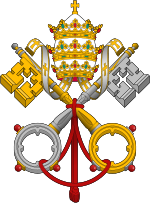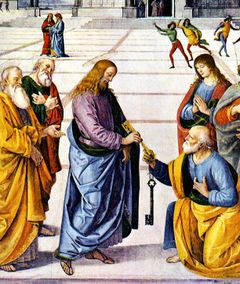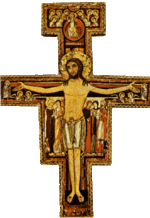Pope Eugene I
| Eugene I | |
|---|---|
 |
|
| Papacy began | 10 August 654 |
| Papacy ended | 2 June 657 |
| Predecessor | Martin I |
| Successor | Vitalian |
| Personal details | |
| Birth name | ??? |
| Born | ??? Rome, Byzantine Empire |
| Died | June 1, 657 Rome, Byzantine Empire |
| Sainthood | |
| Feast day | June 2 |
| Other Popes named Eugene | |
| Papal styles of Pope Eugene I |
|
|---|---|
 |
|
| Reference style | His Holiness |
| Spoken style | Your Holiness |
| Religious style | Holy Father |
| Posthumous style | Saint |
Pope Saint Eugene I or Eugenius I, was pope from 10 August 654, to 1 June 657.
He was a native of Rome, born to one Rufinianus. He was elected pope on 10 August 654, ascended in 655, and died on 1 June 657, of natural causes.
Contents |
Early life
Little is known of Pope Eugene's early life other than that he was a Roman from the Aventine, and was known for his holiness, gentleness, and charity. He had been a cleric from his youth and held various positions within the Church of Rome.[1][2]
Election under unusual circumstances
On the banishment of Martin I by Emperor Constans II, he showed greater deference than his predecessor to the emperor's wishes, and made no public stand against the Monothelitism of the patriarchs of Constantinople.
Martin I was carried off from Rome on 18 June 653, and he was kept in exile until his death in September 655. Little is known about what happened in Rome after Pope Martin's departure, but it was typical in those days for the Holy See to be governed by the archpriest and archdeacon.
After a year and two months, a successor was found to Martin in Eugene.
Reign
Almost immediately after his election, Eugene was forced to deal with the heresy of Monothelitism , i.e., that Christ had only one will.
Constantinople letter affair
One of the first acts of the new pope was to send papal legates to Constantinople with letters to Emperor Constans II, informing him of his election, and professing his faith. The legates unfortunately allowed themselves to be deceived, or bribed, and brought back a synodical letter from Peter, the new Patriarch of Constantinople (656–666), while the emperor's envoy, who accompanied them, brought offerings for St. Peter, and a request from the emperor that the pope would enter into communion with the Patriarch of Constantinople. Peter's letter proved to be written in a difficult and obscure style, and avoided making any specific declaration as to the number of "wills or operations" in Christ. When its contents were read to the clergy and people in the church of St. Mary Major, they not only rejected the letter with indignation, but would not allow the pope to leave the basilica until he had promised that he would not on any account accept it (656).
So furious were the Byzantine officials at this harsh rejection of the wishes of their emperor and patriarch that they threatened, that when the state of politics allowed it, they would roast Eugene, and all the talkers at Rome along with him, as they had roasted Pope Martin I. Eugene was saved from the fate of his predecessor by the advance of the Muslims who took Rhodes in 654, and defeated Constans himself in the naval battle of Phoenix (655).
Later years
It was almost certainly this pope who received the youthful St. Wilfrid on the occasion of his first visit to Rome (c. 654). At Rome he gained the affection of Archdeacon Boniface, a counsellor of the apostolic pope, who presented him to his master. Eugene "placed his blessed hand on the head of the youthful servant of God, prayed for him, and blessed him." Nothing more is known of Eugene except that he consecrated twenty-one bishops for different parts of the world, and that he was buried in St. Peter's.
He died in 657, and was acclaimed a saint, his day being the 2nd of June, although, according to Anastasius, he died on the 1st of that month.
References
- ↑ "Saint of the Day, June 2". St. Patrick Catholic Church. http://www.saintpatrickdc.org/ss/0602.shtml.
- ↑ "St. Eugene I". Christ's Faithful People. http://www.cfpeople.org/Books/Pope/POPEp75.htm.
- The Book of Saints, by the Ramsgate Benedictine Monks of St. Augustine's Abbey
- This article incorporates original text from the 9th edition (1879) of the Encyclopædia Britannica.
 This article incorporates text from a publication now in the public domain: Herbermann, Charles, ed (1913). Catholic Encyclopedia. Robert Appleton Company.
This article incorporates text from a publication now in the public domain: Herbermann, Charles, ed (1913). Catholic Encyclopedia. Robert Appleton Company.
| Catholic Church titles | ||
|---|---|---|
| Preceded by Martin I |
Pope 654–657 |
Succeeded by Vitalian |
|
|||||||||||||||||||||||||||||||||||||||||||||
|
|||||||||||||||||||||||||||||||||||||||||

